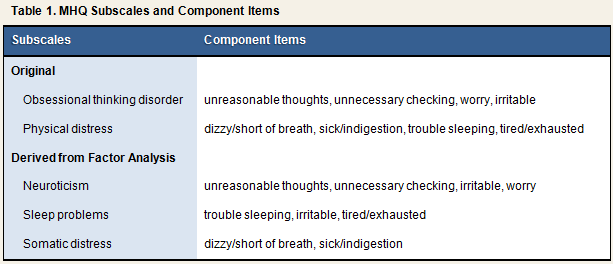Self-Reported Physical and Psychological Symptoms
Title
Select items from the Middlesex Hospital Questionnaire (MHQ)
Study
BCS
Copyright Information
Copyrighted. The scale in its entirety appears in the source article (below). To seek permission, contact the Royal College of Psychiatrists, publisher of the British Journal of Psychiatry.
Primary Reference
Crown, S., & Crisp, A. H. (1966). A short clinical diagnostic self-rating scale for psychoneurotic patients. The Middlesex Hospital Questionnaire (M.H.Q.). British Journal of Psychiatry, 112, 917-923.
Purpose
To assess current general psychological health by asking participants to indicate the extent to which they have experienced a set of psychological and somatic symptoms during the past 6 weeks.
Type of Measure
Modified. The original MHQ (also known as the Crown-Crisp Experiential Index [CCEI]) is comprised of 48 items, which can be subdivided into six 8-item sub-tests: free-floating anxiety; phobic; depressive; hysterical; obsessional; and somatic. The scale used in the BCS incorporated 8 items from the MHQ (4 obsessional, 4 somatic).
Description
Using provided response options, participants answer questions inquiring about how they have been feeling physically and psychologically.
Scaling
Response options for all items are presented on a 3-point scale (range: 0-2), with higher values indicating worse health. Corresponding response labels differ depending on the nature of the item.
Number of Items
8
Scoring
A total score can be derived from the MHQ by summing all 8 items, with higher scores indicating worse health. Subscale scores, likewise, can be derived by summing their component items (see Table 1). As indicated in Table 1, items included in each subscale are not mutually exclusive. In addition to the original three subscales, Table 1 displays 3 alternative subscales that were derived from factor analysis of the MHQ items.
